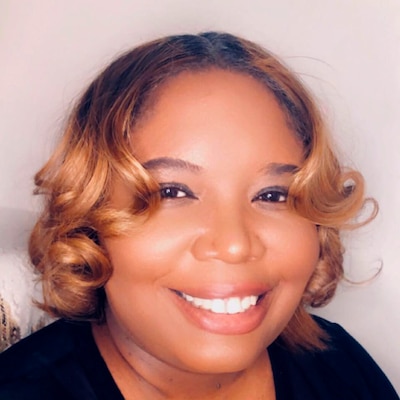Two things Sharita Jerkins learned from teaching students with visual impairments are the importance of being more descriptive while teaching and verbalizing every detail of her lessons. Jerkins, who teaches grades 4-8 at the Overbrook Educational Center, said people often underestimate her students and their ability to excel in a mainstream environment.
“My past and present students are a true example that if the expectations and the proper resources are in place, there is no limit to what a visually impaired or blind student can accomplish,” Jerkins said.

A native of the Nicetown section of Philadelphia and a graduate of Parkway Spring Garden, the high school now called Parkway Northwest, Jerkins knew she wanted to be an educator when she was a child because most of her teachers were “motherly” and “like family.”
“I had teachers that would send letters to my home over the summer and holidays and invited me to their summer homes on vacation,” she recalled. “Most of my teachers had a good relationship with my family and would attend my family events.”
Jerkins earned a bachelor’s in psychology from Cheyney University and a master’s in vision rehabilitation therapy from Salus University. She returned to Salus in 2018 to complete her teacher of the visually impaired, or TVI, certification. Jerkins worked for 11 years as a teacher of the visually impaired at independent and parochial schools in Philadelphia. During that time, she created a state-of-the-art vision resource center in a parochial high school. She also created a life skills summer program.
“I love to expose them to independent living skills, social skills, and assistive technology,” said Jerkins, who joined Overbrook, a Philadelphia district school, in September 2020. “I also want to build confidence in the visually impaired students, empowering them to advocate for themselves and learn that they have the same opportunities as all the students in Philadelphia.”
This interview has been lightly edited for length and clarity.
Growing up, which teacher influenced you the most? Why?
It was Ms. Andrews. She was my fifth grade teacher at Our Lady of Holy Souls School. She taught me the importance of getting an education. Ms. Andrews made learning fun. She advocated for her students in her class. She spent time teaching us African American history. She taught us how to be responsible and organized. She also talked to us about life and encouraged us to be proud as African Americans. She set the academic bar high and set the expectations that we meet that high bar. My class worked hard because we wanted to make her proud of us; as children, we did not realize that we were making ourselves better students. Ms. Andrews left the school after my fifth grade year. She later went to work at Dunbar Elementary School. When I found out she left, I thought to myself, those students will be so lucky to get Ms. Andrews as a teacher.

How did you begin teaching students with visual impairments and blindness?
I started teaching students with visual impairments after my aunt Felicia Whitney left her position as the TVI in non-public schools. My Aunt Felicia is my mentor. She informed me that she was moving on in her career as a TVI, so I applied for the job at the intermediate school at Elwyn, a nonprofit that focuses on education and treatment for children with developmental disabilities and learning challenges. After several interviews, they offered me the position. I did not know what to expect on my first day. However, once I met the students and saw their determination to succeed, it motivated me as a teacher to supply them with all the tools needed to excel at school.
Why is engagement so important, and what are some ways you keep your students engaged?
Engagement is important in the classroom because it keeps the students interested in the subject area. It also creates a learning relationship between the students and the teacher. The first way I keep them engaged is by explaining to them the “why.” Why is this lesson important? I also bring in different cultural aspects to help the students identify with the lesson. I love to add songs and artwork so the student can make alternative connections to my lessons. I encourage them to use all their assistive technology because all my students have visual impairments.
How have you helped your students adjust to in-person learning after a year of virtual learning?
I helped adjust the students to in-person learning by encouraging self-care (getting to bed on time, eating properly, exercising); positive affirmation, giving the students an outlet to express their emotions; and encouraging them to support each other and build healthy relationships with peers and staff.
Tell us about a memorable time — good or bad — when contact with a student’s family changed your perspective or approach.
It was the first time I told a family that their son should learn Braille, and his mother started crying. I was in the meeting thinking they were going to be happy that their son was going to learn Braille to help him read. I asked the mother if she was OK and asked why she was crying. She stated that she had no idea how bad his vision was, and she felt bad that she was unaware. Through that experience, I learned to be more empathic in meeting with parents. I also try to educate parents more on students’ eye conditions before I state the needs of the students.
What was the biggest misconception that you initially brought to teaching?
That teachers are not supported. However, since I started teaching, I have received support from other teachers, parents, principals, the students, the community, and my family and friends. Sometimes I am surprised and overwhelmed by the amount of support and resources that are offered to me when I talk about how amazing my students are when it comes to learning.
What’s the best advice you’ve received about teaching? What’s the most gratifying thing you have experienced in your years of teaching?
Never limit a student in the learning process. The most gratifying experience is watching my middle school students take a science lesson on anatomy and dissect a frog using their functional vision and assistive technology to locate all the organs of the frog. The lesson showed me the importance of encouraging the students to push themselves and showing that they can excel at higher levels.
What else do you want to share or want readers to know?
Visually impaired students at Overbrook Educational Center are exceptional learners and are ready to excel and change the world. I would like to encourage teachers to always challenge themselves to maximize instruction in their classroom. As educators, we sometimes have to push the envelope and set the bar high, then watch our students jump into their greatness.
Bureau Chief Johann Calhoun covers K-12 schools and early childhood education in Philadelphia. He oversees Chalkbeat Philadelphia’s education coverage. Contact Johann at jcalhoun@chalkbeat.org.







